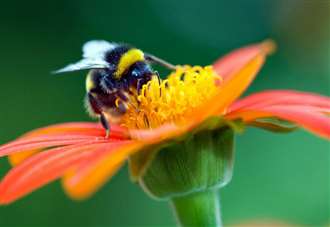A new study has found Kent is the best place to see bumblebees across the UK as numbers continue to plummet.
Walkers in East Kent saw more than 46,000 of them between 2008 and 2024, according to data put together by Releaf.

Equating to 5,000 more sightings than second-ranked North Somerset, Kent was the only county to feature two areas on the list – with West Kent coming in 10th place with 11,200 sightings.
But while the data positions East Kent as the UK’s hotspot, it arrives at a time of growing national concern.
The latest BeeWalk Annual Report, which reviewed the 2024 season, revealed that bumblebee numbers dropped by 22.5% across the UK in just one year.
It was “the worst year for bumblebees since records began”, thanks to the unusually cold and wet spring weather.
Expert Carly Ahlen, an ornithologist who runs Gabo Wildlife, noted this was a trend among all wildlife species – and confirmed the decline in bees was having a knock-on effect.
“It really is having consequences for our summer visiting birds, who rely on them for survival and face the real threat of extinction,” she said.

“[As well as weather] I believe it’s due to how many pesticides we use, and we should change this rapidly.
“We should follow other countries like France, which has banned pesticides from towns and cities, and many other European nations are trying to do the same.
“Even though insects are so small, they have a huge impact and we need to protect them.”
Another threat to the bee population in Kent is the swarms of Killer Asian hornets, which frequent the county.
One beekeeper found his business almost wiped out by the pests as they tore through the hives.
The findings are based on the number of bumblebees recorded by trained volunteers walking fixed routes as part of the BeeWalk scheme, run by the Bumblebee Conservation Trust.
In total, more than 352,000 miles were walked by volunteers – the equivalent of walking around the Earth 14 times.
Sightings are recorded by species, offering a clear picture of which bumblebees are thriving where.
In East Kent, the most frequently recorded species included the Buff-tailed bumblebee, Common carder, Red-tailed bumblebee, Garden bumblebee, and Common carder bee.
